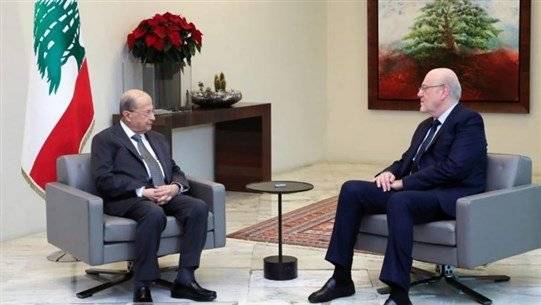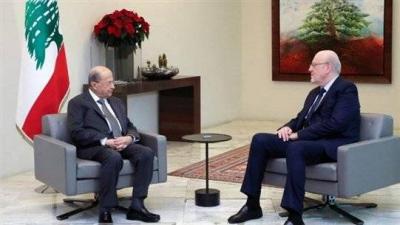A prominent Lebanese political source revealed that the anticipated meeting this week between President Michel Aoun and caretaker Prime Minister Najib Mikati, tasked with forming the new government, represents the last opportunity to clarify the future of efforts to establish it. The source told "Asharq Al-Awsat" that Mikati prefers to maintain the current government while making two adjustments by replacing the Ministers of Economy and Displaced, Amin Salam and Issam Sharafeddine, without closing the door on Aoun's proposal for an expanded government of 30 ministers, including six ministers of state, as long as the ministerial composition does not include prominent names that would be difficult for him to market to Parliament in seeking their confidence.
The political source pointed out that Mikati suggested to Aoun to keep the current government while replacing two ministers with Salam and Sharafeddine. Aoun asked for some time under the pretext of studying the proposal, promising to provide his response later. However, the surprise was Aoun sending the director general of the presidency, Antoine Shuqair, to meet Mikati with the condition that he nominate the two replacement ministers, which Mikati rejected.
Mikati proposed an alternative formula whereby a member from the Northern Moderation bloc would replace Salam, claiming they had previously designated him to form the government, in exchange for a Druze minister affiliated with the "Democratic Gathering" to take Sharafeddine's place, who belongs to the "Lebanese Democratic Party," which no longer has representation in Parliament following the defeat of its leader, MP Talal Arslan, in the elections.
The source noted that Mikati made a concession by not replacing the Minister of Energy, Walid Fayad, who is aligned with Aoun’s "Free Patriotic Movement" led by MP Gibran Bassil, to avoid provoking him, and also to prevent entering into a political clash with Aoun. The source considered Aoun's insistence on nominating the two replacement ministers for Salam and Sharafeddine as a response to his political heir, Bassil, who is cautious about a potential presidential void if a new president is not elected before the end of the current president's term.
The source questioned whether Aoun really wants to safely reach the formation of the government, or if he wants to hinder efforts, plunging the country into a constitutional clash under the pretext that the powers of the president do not transfer by proxy to a caretaker government instead of a fully empowered one. The same question applies to Bassil, who will not facilitate the government's formation unless it meets his criteria and allows him through his "hawks" to control its major aspects while being a partner in the management of the presidential void.
The source further disclosed to "Asharq Al-Awsat" that Aoun, in his last meeting with Mikati after a lengthy hiatus filled with intense political campaigns exchanged between Mikati and Bassil, faced a state of confusion and turmoil due to the differing views of his team with another faction that had withdrawn from him, represented by insiders advising against ensnaring the country into a presidential void and calling for a smooth transitional phase to facilitate the election of a president before the constitutional deadline expires.
In response to a question, the source clarified that Aoun operates under the belief that a 30-member government is the only unifying option with complete powers, which suggests he is already preparing for the possibility of a presidential void that would allow Bassil to redefine himself by including ministers aligned with him, under the pretext that Mikati has managed to accommodate most ministers aligned with him.
The source confirmed that Aoun insists on forming a 30-member government, which is why he remains fixed on nominating the replacement ministers for Salam and Sharafeddine, knowing in advance that Mikati is not inclined to concede to his conditions. The source mentioned that Aoun did not delve into names, as he revealed to Mikati, who refuses to include those loyal to Bassil.
The source denied that Aoun hinted at the possibility of appointing Bassil as one of the ministers of state but suggested that there is an implication that he wants to appease his political heir by providing guarantees for him to be a partner, even indirectly, in managing the void after losing his bet in the presidential race. However, there is nothing preventing Aoun from proposing his son-in-law in the expanded ministerial lineup during his meeting with Mikati, despite their previous meeting not discussing names.
It was concluded that the upcoming meeting between Aoun and Mikati will center around Aoun's insistence on forming a 30-member government, which Mikati could build upon, even though the road to its formation is not clear. It would be better to return to reviving the current government by incorporating two new ministers. The source noted that Speaker Nabih Berri favors Mikati’s proposal and may not object to the formation of an expanded government, as long as Bassil does not dominate it.
Additionally, "Hezbollah," according to the same source, supports the formation of a new government to preempt the mistakes associated with a presidential void, which could lead to an internal division that would be politically and constitutionally uncontrollable, while simultaneously seeking to consider its ally Bassil and not leaving him isolated.
Thus, Mikati, who is adept at maneuvering and does not succumb to blackmail and intimidation, retains the assignment in his possession and does not wish to form a government, distancing himself from embarrassment while showing positive openness to proceed with the government formation process while being vigilant to counter Bassil and his political team's tactics. Therefore, Mikati is keen to prevent the country from falling into division and insists on nullifying all excuses and accusations leveled against him for obstructing the government's formation, placing the blame on Bassil and his team for thwarting efforts to resolve the stalemate surrounding it.
The remaining question is whether Aoun will obstruct the government's revival and insist on forming an alternative expanded government in response to Bassil's conditions, assuming the latter supports its formation and does not wish to drag the country into conflicts that begin with a constitutional clash. However, it is difficult to predict where it might end, under the pretext that necessities justify the prohibited, and that what applies to the caretaker government should also extend to the presidency on the grounds of not leaving public facilities vacant, even though Aoun announced his departure from Baabda upon completing his term.
Finally, the intensifying conflict over the government formation is raising fears that the country is on the brink of a presidential void unless the major and regional powers concerned with electing the president on time intervene decisively to thwart those betting on a prolonged void.




